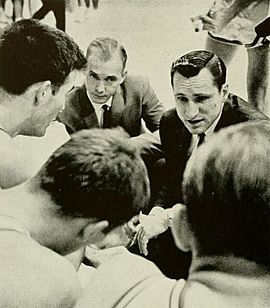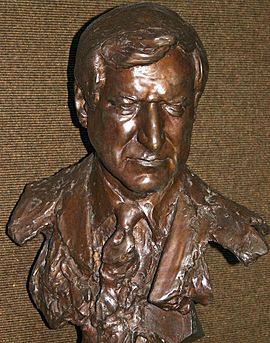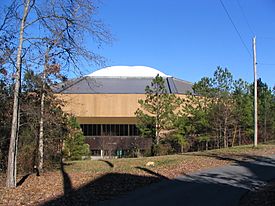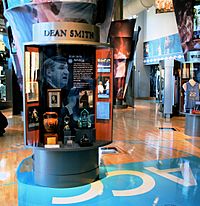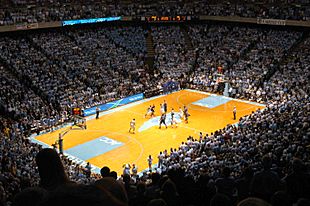Dean Smith facts for kids
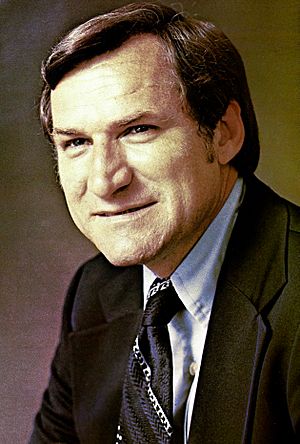
Smith c. 1973
|
|||||||||||
| Biographical details | |||||||||||
|---|---|---|---|---|---|---|---|---|---|---|---|
| Born | February 28, 1931 Emporia, Kansas, U.S. |
||||||||||
| Died | February 7, 2015 (aged 83) Chapel Hill, North Carolina, U.S. |
||||||||||
| Playing career | |||||||||||
| 1949–1953 | Kansas | ||||||||||
| Coaching career (HC unless noted) | |||||||||||
| 1953–1955 | Kansas (assistant) | ||||||||||
| 1955–1958 | Air Force (assistant) | ||||||||||
| 1958–1961 | North Carolina (assistant) | ||||||||||
| 1961–1997 | North Carolina | ||||||||||
| Head coaching record | |||||||||||
| Overall | 879–254 (.776) | ||||||||||
| Accomplishments and honors | |||||||||||
| Championships | |||||||||||
As a coach
NCAA Division I Tournament (1952) |
|||||||||||
| Awards | |||||||||||
|
|||||||||||
| Basketball Hall of Fame Inducted in 1983 |
|||||||||||
| College Basketball Hall of Fame Inducted in 2006 |
|||||||||||
|
Medal record
|
|||||||||||
Dean Edwards Smith (February 28, 1931 – February 7, 2015) was a famous American college basketball coach. He was known as a "coaching legend" by the Basketball Hall of Fame. He coached for 36 years at the University of North Carolina at Chapel Hill.
Smith coached from 1961 to 1997. He retired with 879 wins, which was a record at that time for NCAA Division I men's basketball. He had one of the highest winning percentages in college basketball history (77.6%). During his time as head coach, North Carolina won two national championships and reached the Final Four 11 times. Before coaching, Smith played college basketball at the University of Kansas. He won a national championship there in 1952, playing for coach Phog Allen.
Smith was also known for running a fair program and for his players doing well in school. About 96.6% of his athletes earned their college degrees. He also helped bring about desegregation by recruiting the university's first African-American scholarship basketball player, Charlie Scott. Smith also pushed for equal treatment for African Americans in local businesses. Many of his players and assistants went on to have successful careers in basketball. Smith retired in 1997 because he felt he could no longer bring the same energy to the team. After retiring, he supported various charities and political causes.
Contents
Biography
Early Years and College
Dean Smith was born in Emporia, Kansas, on February 28, 1931. Both of his parents were teachers. His father, Alfred, coached the Emporia High Spartans basketball team to a state title in 1934. This team was special because it had the first African American basketball player in Kansas tournament history. Dean Smith played basketball all four years in high school, first at Emporia High and then at Topeka High School. He was named all-state in basketball as a senior. He also played quarterback in football and catcher in baseball.
After high school, Smith went to the University of Kansas on a scholarship. He studied mathematics. While at Kansas, he played varsity basketball and baseball, and freshman football. He was also part of the Air Force ROTC. His college basketball team won the national championship in 1952. In 1953, they were finalists in the NCAA tournament. Smith's basketball coach at Kansas was Phog Allen, who had been coached by James Naismith, the inventor of basketball. After graduating, Smith was an assistant coach at Kansas for one season.
Coaching Career
Starting Out
After college, Smith joined the United States Air Force in 1954. He was stationed in Germany and played on a team that won the Air Force championship for Europe. He also coached baseball and golf teams for the United States Air Force Academy. His big chance in basketball came in 1958. The North Carolina coach, Frank McGuire, asked Smith to be his assistant. Smith worked for McGuire for three years. In 1961, McGuire left, and Smith became the head coach.
When Smith became head coach, he was only 30 years old. The university leader told him that winning was important, but running a fair program and representing the university well was even more important.
Because of a past basketball scandal, North Carolina played fewer games in Smith's first season. They played only 17 games and had a record of 8 wins and 9 losses. This was the only losing season Smith had in his entire career. After that, his teams became very successful. From 1965-1966 onwards, Smith's teams always finished near the top of the ACC conference. For 21 of those years, they were never worse than second place.
Smith's first big successes were in the late 1960s. His teams won conference championships and went to the Final Four three years in a row. They even reached the national championship game in 1968. His teams played in either the NCAA or NIT tournament for his last 31 years at North Carolina.
First National Championship
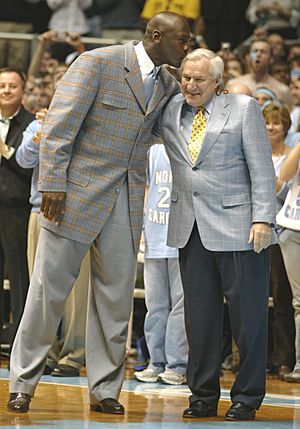
Smith won his first national championship with his 1981–82 team. This team included future NBA stars like Michael Jordan, James Worthy, and Sam Perkins. After winning the NCAA Tournament, North Carolina had an amazing record of 32 wins and 2 losses.
The championship game against Georgetown was very close. With only 17 seconds left, and North Carolina down by one point, Michael Jordan made a shot that put the Tar Heels ahead 63–62. On Georgetown's next play, a player accidentally passed the ball to James Worthy. Worthy was fouled but missed both free throws. Georgetown tried a long shot at the end, but it missed. This gave Smith his first national championship after reaching the Final Four seven times.
Second National Championship
Dean Smith's 1992–93 team had great players like George Lynch, Eric Montross, and Donald Williams. They started the season strong, winning 8 games in a row. They were ranked #1 in the country for the first time since 1987. North Carolina won their last two regular-season games against Wake Forest and Duke. They reached the ACC tournament final but lost.
Still, North Carolina was given the top seed in their region for the NCAA tournament. They won their games to reach the Final Four in New Orleans. In the semifinals, Smith's team beat his old college, Kansas, which was coached by Roy Williams. This win set up a rematch in the finals against Michigan, a team they had lost to earlier in the season.
The 1993 national title game was a back-and-forth battle. It is most remembered for Michigan's Chris Webber calling a timeout when his team had none left. This resulted in a penalty for Michigan. North Carolina ended up winning 77–71, giving Smith his second national championship.
Retirement
Smith suddenly announced his retirement on October 9, 1997. He had always said he would retire if he couldn't bring the same energy to his team. His announcement was a surprise. Bill Guthridge, who had been his assistant for 30 years, took over as head coach.
Even after retiring, Smith still had a big impact on the North Carolina basketball program. In 2003, he spoke with Roy Williams about becoming the head coach. In his later years, Smith had memory problems. His family shared that he had a "progressive neurocognitive disorder." He sometimes had trouble remembering names but always remembered his relationships with his players.
Coaching Style
Smith's teams played in different ways depending on his players. But generally, they liked to play fast, pass the ball well in offense, and play strong defense to get the ball back. From 1970 until he retired, his teams shot the ball very well, making over 50% of their shots in almost every season.
Smith is known for creating or making popular several basketball techniques:
- The "tired signal": Players would use a hand signal to show they needed a rest.
- Huddling at the free throw line: Players would gather before a foul shot.
- Pointing to the passer: After scoring, a player would point to the teammate who passed them the ball, to show thanks for their teamwork.
- Using many different defensive strategies in one game.
- Having the point guard (the player who leads the offense) call out the defense for the team.
- Creating new defensive plays, like the "point zone" and "run-and-jump."
Smith was also famous for using the "four corners offense." This was a strategy to hold onto the ball when a team had a lead near the end of the game. Smith's teams were so good at this that in 1985, the NCAA added a shot clock to speed up the game. Smith also wrote a best-selling basketball book called Basketball: Multiple Offense and Defense.
He also started the tradition of letting all senior players start the last home game of the season. This was a way to honor all the players, even those who didn't play much. One time, he even put six seniors on the court at the start of a game, which caused a penalty, just so he could honor all of them.
Smith's student athletes had a very high graduation rate of 96.6% at North Carolina. He was known for running a very fair and honest program.
Personal Life
Smith married Ann Cleavinger in 1954. They had three children: Sharon, Sandy, and Scott. They divorced in 1973. Smith then married Linnea Weblemoe Smith in 1976. They have two daughters, Kristen and Kelly.
Death
Dean Smith passed away on February 7, 2015, at age 83, at his home in Chapel Hill. His family was with him. A private funeral was held, and he was buried at Old Chapel Hill Cemetery. A public memorial service was held later at the Dean Smith Center.
Michael Jordan, who played for Dean Smith at North Carolina, said that Smith was the most important person in his life, besides his parents. Jordan called him "more than a coach — he was a mentor, my teacher, my second father."
Smith left a special gift in his will. He gave a $200 check to each of the former players he had coached. The checks came with a message: "Enjoy a dinner out compliments of Coach Dean Smith.” About 180 former players received these checks.
Accomplishments and Recognition
Accomplishments
Here are some of Dean Smith's amazing achievements:
- He won 879 games in 36 years of coaching. This was the most wins for any coach when he retired.
- He had a 77.6% winning percentage, which is one of the highest ever.
- He had 27 seasons in a row with at least 20 wins, and 30 total 20-win seasons.
- He won two national championships (1982, 1993).
- His teams reached the Final Four 11 times.
- He won 17 regular-season ACC titles and 13 ACC tournament titles.
- His teams made 31 straight appearances in either the NCAA Tournament or NIT.
- He recruited 26 All-Americans to play for him at North Carolina.
- Many of his players became very successful in the NBA. These include Michael Jordan, James Worthy, Sam Perkins, and Charlie Scott. Smith coached 25 players who were picked in the first round of the NBA draft.
- In 1976, Smith coached the United States team to a gold medal at the Summer Olympics in Montreal.
- He is one of only three coaches to have won an Olympic gold medal, an NIT championship, and an NCAA championship.
- He was one of only two people (along with Bob Knight) to have played on and coached a winning NCAA championship basketball team.
Recognition
Smith received many honors during his career. He was named National Coach of the Year four times and ACC Coach of the Year eight times. He was inducted into the Basketball Hall of Fame in 1983.
The basketball arena at North Carolina, the Dean Smith Center, is named after him. It is also called the "Dean Dome." Smith coached the last 11.5 years of his career in this arena. In 1997, after he retired, Sports Illustrated magazine named him Sportsman of the Year. ESPN called Smith one of the five greatest American coaches of all time in any sport. In 1998, he won the Arthur Ashe Courage Award.
In 2006, Smith was recognized as a member of the first class of the National Collegiate Basketball Hall of Fame. In 2007, he was also honored in the FIBA Hall of Fame. On November 20, 2013, President Barack Obama gave Smith the Presidential Medal of Freedom, which is one of the highest awards a civilian can receive in the U.S. In 2021, a part of Interstate 40 was named "Dean Smith Highway" in his honor.
Political Activities
Dean Smith was known for his support of certain political ideas. He was especially known for helping to end desegregation (the separation of people based on race). In 1964, he helped a local restaurant become integrated. He also made history by recruiting Charlie Scott as the first African-American scholarship athlete for the Tar Heels basketball team. In 1965, Smith helped Howard Lee, a black graduate student, buy a home in a neighborhood that was all white.
Smith also spoke out against the Vietnam War. In the 1980s, he made radio ads to support stopping the spread of nuclear weapons. He was also strongly against the death penalty. In 1998, he spoke at a hearing for a person on death row, saying that the death penalty made everyone involved "murderers." He even held basketball practices in North Carolina prisons sometimes.
After he retired, he continued to speak about important issues like the Iraq War and gay rights. He supported Barack Obama's candidacy for President in 2008.
Coaching Tree
Dean Smith believed in the "Carolina Family." This idea meant that anyone connected to the basketball program would support each other. Many of his former players and coaching staff became successful basketball coaches and leaders. Some of them include:
- Larry Brown: A former player for Smith, who coached teams in both the NBA and college, winning championships.
- Hubert Davis: The current head coach at North Carolina.
- Matt Doherty: A former player for Smith and a former head coach at North Carolina.
- George Karl: A point guard under Smith, who became a successful NBA head coach.
- Mitch Kupchak: The current general manager of the Charlotte Hornets.
- Doug Moe: A former NBA coach and NBA Coach of the Year.
- Roy Williams: A former assistant coach for Smith and a very successful head coach at both Kansas and North Carolina.
Smith was also part of a coaching lineage that goes back to James Naismith, the inventor of basketball, through his college coach Phog Allen.
Head Coaching Record
| Season | Team | Overall | Conference | Standing | Postseason | ||||
|---|---|---|---|---|---|---|---|---|---|
| North Carolina Tar Heels (Atlantic Coast Conference) (1961–1997) | |||||||||
| 1961–62 | North Carolina | 8–9 | 7–7 | T–4th | |||||
| 1962–63 | North Carolina | 15–6 | 10–4 | 3rd | |||||
| 1963–64 | North Carolina | 12–12 | 6–8 | 5th | |||||
| 1964–65 | North Carolina | 15–9 | 10–4 | T–2nd | |||||
| 1965–66 | North Carolina | 16–11 | 8–6 | T–3rd | |||||
| 1966–67 | North Carolina | 26–6 | 12–2 | 1st | NCAA University Division Final Four | ||||
| 1967–68 | North Carolina | 28–4 | 12–2 | 1st | NCAA University Division Runner-up | ||||
| 1968–69 | North Carolina | 27–5 | 12–2 | 1st | NCAA University Division Final Four | ||||
| 1969–70 | North Carolina | 18–9 | 9–5 | T–2nd | NIT First Round | ||||
| 1970–71 | North Carolina | 26–6 | 11–3 | 1st | NIT Champion | ||||
| 1971–72 | North Carolina | 26–5 | 9–3 | 1st | NCAA University Division Final Four | ||||
| 1972–73 | North Carolina | 25–8 | 8–4 | 2nd | NIT Semifinals | ||||
| 1973–74 | North Carolina | 22–6 | 9–3 | T–2nd | NIT First Round | ||||
| 1974–75 | North Carolina | 23–8 | 8–4 | T–2nd | NCAA Division I Second Round | ||||
| 1975–76 | North Carolina | 25–4 | 11–1 | 1st | NCAA Division I First Round | ||||
| 1976–77 | North Carolina | 28–5 | 9–3 | 1st | NCAA Division I Runner-up | ||||
| 1977–78 | North Carolina | 23–8 | 9–3 | 1st | NCAA Division I First Round | ||||
| 1978–79 | North Carolina | 23–6 | 9–3 | 1st | NCAA Division I Second Round | ||||
| 1979–80 | North Carolina | 21–8 | 9–5 | T–2nd | NCAA Division I Second Round | ||||
| 1980–81 | North Carolina | 29–8 | 10–4 | 2nd | NCAA Division I Runner-up | ||||
| 1981–82 | North Carolina | 32–2 | 12–2 | T–1st | NCAA Division I Champion | ||||
| 1982–83 | North Carolina | 28–8 | 12–2 | T–1st | NCAA Division I Elite Eight | ||||
| 1983–84 | North Carolina | 28–3 | 14–0 | 1st | NCAA Division I Sweet Sixteen | ||||
| 1984–85 | North Carolina | 27–9 | 9–5 | T–1st | NCAA Division I Elite Eight | ||||
| 1985–86 | North Carolina | 28–6 | 10–4 | 3rd | NCAA Division I Sweet Sixteen | ||||
| 1986–87 | North Carolina | 32–4 | 14–0 | 1st | NCAA Division I Elite Eight | ||||
| 1987–88 | North Carolina | 27–7 | 11–3 | 1st | NCAA Division I Elite Eight | ||||
| 1988–89 | North Carolina | 29–8 | 9–5 | T–2nd | NCAA Division I Sweet Sixteen | ||||
| 1989–90 | North Carolina | 21–13 | 8–6 | T–3rd | NCAA Division I Sweet Sixteen | ||||
| 1990–91 | North Carolina | 29–6 | 10–4 | 2nd | NCAA Division I Final Four | ||||
| 1991–92 | North Carolina | 23–10 | 9–7 | 3rd | NCAA Division I Sweet Sixteen | ||||
| 1992–93 | North Carolina | 34–4 | 14–2 | 1st | NCAA Division I Champion | ||||
| 1993–94 | North Carolina | 28–7 | 11–5 | 2nd | NCAA Division I Second Round | ||||
| 1994–95 | North Carolina | 28–6 | 12–4 | T–1st | NCAA Division I Final Four | ||||
| 1995–96 | North Carolina | 21–11 | 10–6 | 3rd | NCAA Division I Second Round | ||||
| 1996–97 | North Carolina | 28–7 | 11–5 | 2nd | NCAA Division I Final Four | ||||
| North Carolina: | 879–254 (.776) | 364–136 (.728) | |||||||
| Total: | 879–254 (.776) | ||||||||
|
National champion Conference regular season champion Conference tournament champion |
|||||||||
See also
 In Spanish: Dean Smith para niños
In Spanish: Dean Smith para niños
 | Frances Mary Albrier |
 | Whitney Young |
 | Muhammad Ali |


